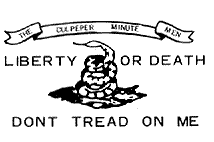
| Users Online Now: 2,148 (Who's On?) | Visitors Today: 1,195,309 | |
| Pageviews Today: 1,995,984 | Threads Today: 823 | Posts Today: 14,269 |
| 07:13 PM | ||

| Users Online Now: 2,148 (Who's On?) | Visitors Today: 1,195,309 | |
| Pageviews Today: 1,995,984 | Threads Today: 823 | Posts Today: 14,269 |
| 07:13 PM | ||
Page 1 Previous Page Next Page | |
The Idea of Secession Isn't Going Away | |
| Don Draper from Nantucket
Offer Upgrade User ID: 57553864 03/02/2021 08:39 AM  Report Abusive Post Report Copyright Violation | [link to mises.org (secure)] Secession is a four-letter word for the millions of Americans who have gone through the conventional educational pipeline that teaches them that the American state is indivisible and sacrosanct. However, intellectually honest historians whose minds haven’t been warped by educational institutions know better than to dismiss secessionism as some nefarious activity that only treasonous Southerners of the Confederacy are capable of engaging in. For all intents and purposes, the founding generation was secessionist. When they signed on to the Declaration of Independence, those who fomented the American Revolution were committed to liberating themselves from the grasp of the British Empire. Quite arguably the most important act of secession in human history, the revolutionaries' successful efforts to secede from British rule had the whole world awestruck. More importantly, it cemented the idea of political separation in the American political consciousness. Before becoming a state, Vermont went the extra mile after the thirteen colonies declared their independence, breaking free from New York and Great Britain and establishing itself as an independent republic in 1777. It would remain that way until 1791, when it ratified the US Constitution and joined the union. Even during the ratification of the Constitution, many states feared the idea of a government that would become excessively centralized. So they had secessionist backup plans in case things got out of hand. In the Politically Incorrect Guide to American History, Tom Woods touched on how the New York, Rhode Island, and Virginia “explicitly reserved during the ratification of the Constitution the right to withdraw from the Union should it become oppressive.” Secession Attempts in the Early Days of the American Republic Americans’ secessionist streak did not go away so easily after they extricated themselves from the dominion of their British overlords. Secessionist talks grew stronger during the presidency of Thomas Jefferson. The Federalist Party, based in New England, was dismayed with having Jefferson as president and even more concerned about the ascendant Democratic-Republican Party. They viewed Jeffersonian Democrats as a political force that could potentially displace them thanks to the electoral advantages the Democratic-Republicans enjoyed in the South and the newly incorporated Western states. Federalist apprehensions became even more palpable during James Madison’s presidency, when the US locked horns with the British Empire in the War of 1812. Many Northerners wanted to maintain peaceful relations with their British cousins and were not keen on bellicosity. As a consequence, New England members of the Federalist Party gathered during the Hartford Convention in 1814 to discuss the New England states’ relationship with the federal government, which sparked nationwide fears of secessionism in New England.  PLATA BITCHEZZZZZZ UPGRADE UNAVAILABLE The Rolling Stones said it best... "What's confusing you is the nature of my game" |
Page 1 Previous Page Next Page | |
